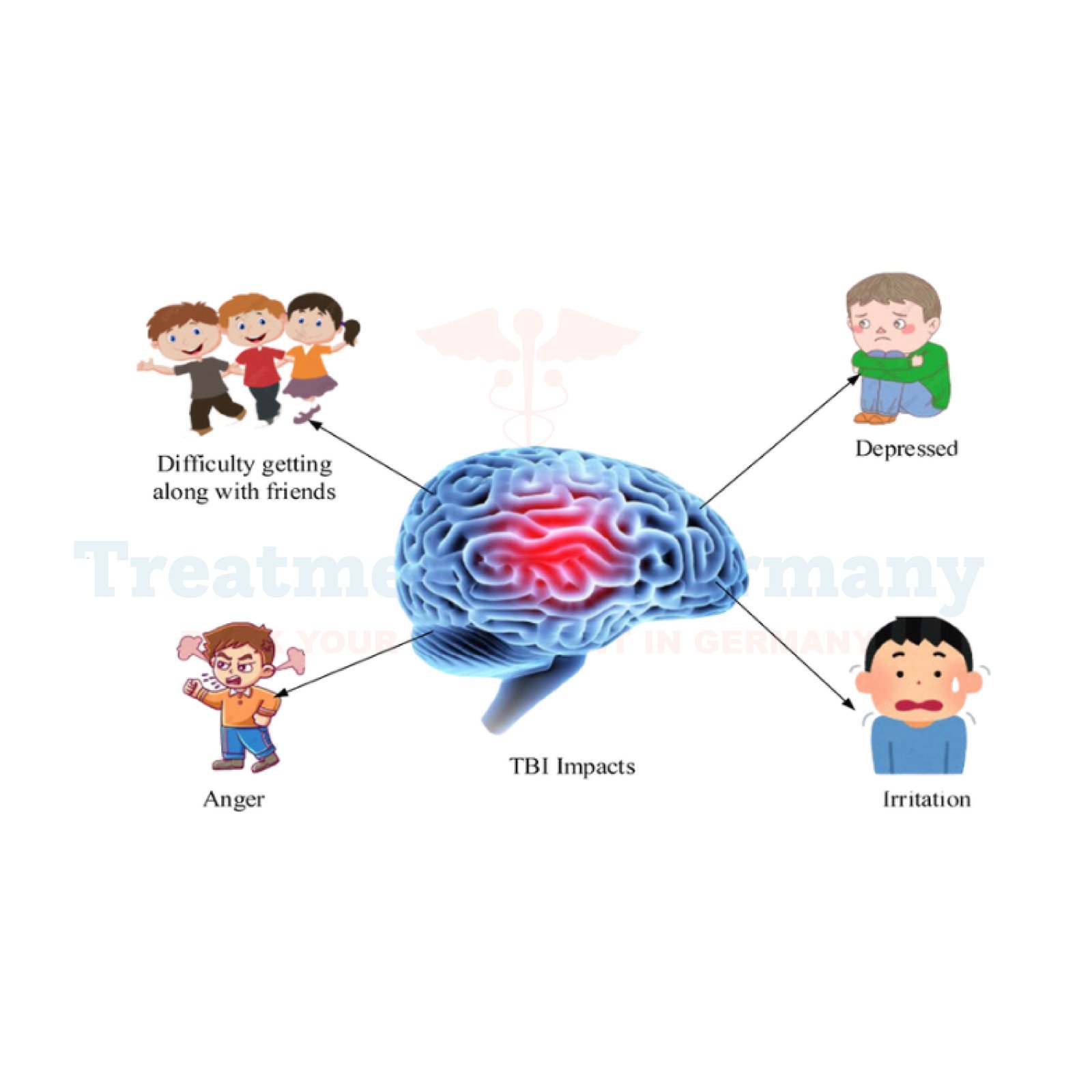Traumatic Brain Injury (TBI) is a critical medical condition caused by a sudden forceful blow or jolt to the head that disrupts the brain’s normal functioning. It often results from incidents such as car accidents, falls, sports-related injuries, or violent events. TBI can range in severity, from mild concussions to life-threatening conditions, and can lead to significant physical, cognitive, and emotional challenges. Prompt and specialized treatment is essential for recovery, and Germany has established itself as a global leader in offering innovative treatment solutions through advanced medical facilities, experienced specialists, and cutting-edge technology.
TBI occurs when an external force damages the brain, leading to either temporary or permanent impairments. This damage can affect memory, motor functions, sensory perception, and emotional behavior. Timely diagnosis and personalized care are critical to reducing complications and ensuring the best possible outcomes for individuals with TBI.
TBI is classified based on the severity and nature of the injury. Common types include:
Concussions:
The mildest and most prevalent form of TBI, often caused by a direct hit to the head. Symptoms are usually temporary but can persist without proper care.
Contusions:
Bruising of brain tissue due to blunt trauma. These injuries may cause localized bleeding and swelling.
Penetrating Injuries:
Severe injuries occur when a foreign object penetrates the skull, directly damaging the brain tissue and typically requiring surgery.
Diffuse Axonal Injury (DAI):
Caused by violent movement or shaking of the brain inside the skull, leading to widespread nerve fiber damage.
Hematomas:
Blood pooling or clot formation within the brain or between the skull and brain, which can increase pressure and damage brain tissues.
Risk Factors for TBI
Various factors elevate the risk of experiencing TBI:
Accidents and Falls:
One of the most common causes of TBI, especially in older adults and children.
Sports Injuries:
High-contact sports, such as football, boxing, and hockey, are major contributors.
Violence:
Incidents involving assaults, gunshots, or domestic abuse frequently result in TBI.
Health Conditions:
Chronic illnesses such as autoimmune diseases, diabetes, obesity, and high cholesterol (hyperlipidemia) can hinder recovery or worsen symptoms.
Lifestyle and Age:
Young adults engaging in risky activities and elderly individuals prone to falling are more vulnerable.
Symptoms of Traumatic Brain Injury
TBI symptoms vary in intensity based on the injury’s severity:
Mild TBI Symptoms:
Headache, dizziness, nausea, temporary memory issues, fatigue, and sensitivity to light or noise.
Moderate to Severe TBI Symptoms:
Persistent headaches, seizures, repeated vomiting, difficulty waking up, loss of coordination, confusion, or speech impairment.
Changes in mood, behavior, or cognitive abilities.
Diagnosis and Diagnostic Tools for TBI
Accurate and prompt diagnosis of TBI is crucial for effective treatment planning. German hospitals utilize advanced diagnostic techniques, including:
Neurological Exams:
These assess motor, sensory, and cognitive functions to evaluate the impact of the injury.
X-rays:
Detect fractures or injuries to the skull.
MRI (Magnetic Resonance Imaging):
Offers detailed imaging to identify swelling, bleeding, or damage to brain tissues.
CT (Computed Tomography) Scans:
A rapid diagnostic tool used to identify brain injuries and assess the extent of trauma.
Blood Tests:
Screen for complications, such as infections or autoimmune diseases, that may influence treatment.
Neuropsychological Assessments:
Evaluate cognitive functions, memory, and problem-solving abilities.
TBI Treatment in Germany
Germany stands out for its innovative and multidisciplinary approach to managing TBI, combining the latest technology with personalized care from skilled specialists.
Emergency Care
Immediate stabilization includes controlling bleeding, ensuring oxygen delivery, and managing intracranial pressure.
German intensive care units are equipped with state-of-the-art life-support and monitoring systems.
Medication Management
Pain Relievers:
Alleviate headaches and discomfort.
Anti-Seizure Drugs:
Reduce the risk of seizures, a common complication of moderate or severe TBI.
Steroids and Diuretics:
Help minimize swelling and pressure inside the skull.
Surgical Options
Decompressive Craniectomy:
A procedure to remove part of the skull to relieve pressure from brain swelling.
Hematoma Removal:
Removes blood clots to prevent further damage.
Reconstructive Surgery:
Repairs skull fractures and restores structural stability.
Rehabilitation Programs
Physical Therapy:
Aims to regain motor skills and strength.
Cognitive Rehabilitation:
Focuses on improving memory, critical thinking, and decision-making.
Speech Therapy:
Helps patients recover language and communication abilities.
Holistic and Complementary Therapies
Germany incorporates mindfulness practices, acupuncture, and other alternative therapies to promote overall recovery.
Advanced Rehabilitation Technologies
Robotics and Virtual Reality:
Enhance physical recovery and retrain cognitive functions through innovative tools.
Why Germany is a Preferred Destination for TBI Treatment
Germany’s healthcare system is globally recognized for its excellence in treating complex medical conditions like TBI. Key reasons to consider Germany for treatment include:
Innovative Treatment Options:
From AI-driven diagnostics to minimally invasive surgeries, Germany sets benchmarks in healthcare innovation.
Renowned Hospitals:
Equipped with cutting-edge facilities and staffed by multidisciplinary teams of experts.
Specialized Doctors and Surgeons:
German neurologists, neurosurgeons, and rehabilitation specialists have extensive expertise in handling TBI cases.
Comprehensive Rehabilitation Plans:
Individualized recovery programs tailored to patients’ needs.
Support for International Patients:
Many German hospitals provide language assistance and personalized care packages for foreign patients.
Conclusion
Traumatic Brain Injury is a serious condition that demands immediate and advanced medical intervention to ensure recovery and prevent long-term complications. Germany’s healthcare system combines state-of-the-art technology, highly trained specialists, and holistic rehabilitation programs to provide unparalleled care for TBI patients.
With its innovative treatment techniques, world-class facilities, and patient-focused approach, Germany has become a leading destination for TBI treatment. Choosing Germany ensures not only medical excellence but also a comprehensive recovery journey tailored to the unique needs of each patient. Whether it’s advanced diagnostics, emergency care, or specialized rehabilitation, Germany offers everything necessary for effective TBI management and improved quality of life.
👉 Contact us for further information and receive a complimentary consultation.


.webp)
 (1).webp)

.webp)
 (1).webp)


.webp)
 (1).webp)

.webp)
 (1).webp)
